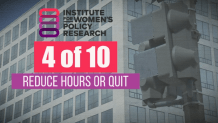After the Trump administration ordered federal workers to end remote work and return to offices full-time, some parents say they feel forced to choose between their jobs and their families. Experts say the end of remote work could have ripple effects in the U.S. economy. News4’s Tracee Wilkins spoke with federal worker moms about their experience and the big picture.
After the Trump administration ordered federal workers to end all remote work and return to offices full-time, some parents say they feel forced to choose between their jobs and their families.
Experts say the end of remote work could have ripple effects in the U.S. economy.
Federal employees who spoke with NBC Washington said remote work helped them balance their public service careers with their need to care for their families.
“I wasn’t caregiving for my child while working, but [remote work] allowed me to pick up my son on time, drop him off on time and just be able to work and have a career as a single mom,” one federal worker mom said.
Get top local stories in Philly delivered to you every morning. Sign up for NBC Philadelphia's News Headlines newsletter.
After 14 years of serving the government while working remotely, President Donald Trump’s order to report to an office full-time changed her life and her career. Without the ability to work remotely or money to pay for afterschool child care, she didn’t see any way to keep her job and also care for her child.
When she received the now-infamous Fork in the Road email from Elon Musk’s Department of Government Efficiency, pressuring federal workers to resign or risk being laid off, she decided taking the deferred resignation was her best option. She said she didn’t want to pull her son out of his school and move closer to D.C. amid threatened layoffs.
“I didn’t want this. I was forced to take this route,” she said.
Investigations
NBC Washington spoke with her as she packed up family memories in her Loudoun County, Virginia, home in preparation to move out of state. She asked to have her identity concealed and alter her voice out of fear of retaliation.
‘Thought I would have to quit’
In Montgomery County, Maryland, another federal worker mom also found herself having to make a tough decision.
The Department of Homeland Security employee primarily worked from home for years. She thought the contract she signed protected her telework arrangement. Then Trump’s order said she needed to report to the office full time within weeks.
“I literally for a second thought I would have to quit,” she said. She also asked NBC Washington to conceal her identity, days after she said DOGE was in her office.
She and her husband had been able to avoid putting their son in day care thanks to help from family and her husband’s flexible work schedule. Suddenly, they were scrambling to find child care. The federal worker said she felt “unbelievably lucky” to find a day care spot for $1,600 per month. Her husband began working overtime to help cover the cost, they’re watching their household expenses and they’re feeling the loss of family time they once had together.
“I have to drop him off very early in the morning and then either leave early from work or just pick him up really late,” she said.
She’s a fourth-generation civil servant proud of her years of government service. The return-to-office order made her and her colleagues feel degraded at work, but she plans to stay.
“I have no plans of leaving. I want to stick this job out. I just love it so much,” she said.
‘We might see a reduction in women's labor force participation’
The return-to-office order is forcing caregivers to make difficult choices that could matter for the economy more broadly, said Kate Bahn, chief economist at the Institute for Women’s Policy Research, a nonpartisan nonprofit dedicated to sustaining a thriving economy that includes women.
“When you have really limited choices, you’re not necessarily making a good choice, you’re just making the best choice you can for yourself,” she said.
Bahn’s research shows that in over half of American families, women serve as the co-breadwinner or sole breadwinner.
“Not having those incomes, their families would not have adequate economic well-being,” she said.
Ending remote work isn’t just tough for many individual caregivers; it also may push sizable numbers of women out of the workforce altogether, said Bahn, who’s a new mom herself.
“We might see a reduction in women's labor force participation. So, women just dropping out altogether because they can't manage caregiving responsibilities alongside their jobs,” she said. “Or we'll see women making really constrained choices when they do work, so, taking a job that's maybe suboptimal for them, they don't like as much, they don't earn as much, but they just don't have another choice because it's the only thing that works with their caregiving responsibilities.”
Six in 10 women surveyed by Bahn’s group said job flexibility determines whether they’ll accept a job offer. Without flexibility, 4 in 10 said they would reduce their hours or leave their jobs altogether.

Data shows women are already underrepresented in the federal government, at 45%, compared to 58% in the private sector, according to federal data and the U.S. Bureau of Labor Statistics.
The White House said data was not available on how many women have resigned, retired or been laid off from the federal workforce since Inauguration Day.
Why Rep. Brittany Pettersen says policies supporting parents matter
The impact of workplace restrictions is being felt at the highest levels of government.
“These systems are not made for us. They’re made for, historically, for older, wealthier white men,” said Rep. Brittany Pettersen, a Democrat who represents Colorado’s 7th District.
Just four weeks after Pettersen gave birth to her second son, she found herself flying across the country with her newborn so she could vote on critical legislation. Congress required in-person voting. She championed a bill to allow proxy voting for new parents, but it hasn’t gained needed support.

“These are common-sense changes that we can do to make sure that people like me who have just given birth aren't putting their health at risk and their newborn's health at risk,” she said.
Pettersen argues creating policies to support parents in Congress will ultimately help the families they represent.
“When we start to change the people who are elected and the life experiences that they have, you're gonna start to see policies change that are actually supporting the families that are struggling the most right now,” she said.
‘Taking a leap of faith’
In Loudoun County, the federal worker who decided to leave her career after over a decade packed up her son’s toys and considered how they would both adjust to the next chapter in their lives. Her son would make new friends at a new school, and she would look into starting her own consulting firm in her hometown.
“It’s scary. It’s really scary and overwhelming. But I’m taking a leap of faith,” she said.
She said the return-to-office order forced her to choose between showing up at the office and showing up for her son, and she chose her son.
“As a single mom, most importantly to me, I’ve been able to successfully and substantially provide for my son. I don’t want to cry,” she said, fighting tears. “For me, it means the world to provide for my son and not have to ask for any help.”
Reported by Tracee Wilkins, produced by Andrea Swalec and Katie Leslie, shot by Jeff Piper and Evan Carr, and edited by Jeff Piper



